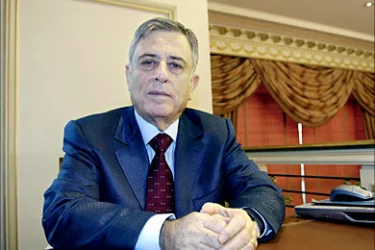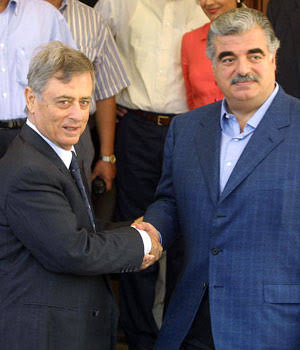Dubai, United Arab Emirates – Abdel Halim Khaddam, one of the most controversial Syrian politicians known for his “bold” positions and his departure from the rule of the Baath Party in 2005, has been a prominent figure and a highly influential figure in Syrian foreign policy since Hafez al-Assad assumed power. Following the confirmation of his death by a close friend to CNN on Tuesday morning in the French capital, Paris, we will provide an overview of Abu Jamal’s political life.
Khaddam’s initial foray into politics began with his appointment as governor of Quneitra in 1963, followed by his role as governor of Hama. In 1969, under the leadership of former Syrian President Noureddine al-Atasi, Abu Jamal assumed the position of Minister of Economy and Trade. He later served as an advisor to Hafez al-Assad and eventually became the Minister of Foreign Affairs on November 13, 1970, when the latter assumed power.
Khaddam’s tenure as Minister of Foreign Affairs, spanning nearly 14 years and four months, was marked by his significant influence on Syrian foreign policy. His role expanded to include Lebanon, where he was often referred to as the “High Envoy” due to his involvement in the resolution of the Lebanese civil war.
37 days into the presidency
following the death of Hafez al-Assad in June 2000, Khaddam assumed the chairmanship of a committee tasked with overseeing the transfer of power. The committee elected him as the interim president of the country. Despite rumors suggesting his intention to remain in power, he relinquished the office after just 37 days when Bashar al-Assad was elected as president on July 17 of the same year.
Subsequently, Khaddam, having defected from the party, emerged as one of the most prominent opponents of the Syrian leadership under Assad Jr.’s rule. On June 5, 2005, he announced his resignation from the party, to which he had belonged since the age of 17, in opposition to several policies pursued by the leadership in his country, including the alleged involvement in the killing of his close friend, Lebanese Prime Minister Rafic Hariri.
At a general conference of the Baath Party, Abu Jamal, as he was known, became the first prominent Syrian figure to publicly break away from the party. He subsequently relocated to Paris, becoming the last member of Hafez al-Assad’s “Old Guard” to defect from power in Syria.
After leaving Syria, Khaddam claimed that Bashar al-Assad had repeatedly threatened Rafik Hariri. Later, the Syrian People’s Assembly voted in favor of charging Khaddam with treason before his meeting with the UN investigators responsible for probing Hariri’s assassination in January 2006. Khaddam asserted that Assad had ordered the former Lebanese Prime Minister’s killing.
In absentia, Khaddam was subjected to a trial in a military court in Damascus, where he received a life sentence with hard labor for “defaming the Syrian leadership and spreading false information” before the international tribunal investigating Hariri’s assassination.
Khaddam declared the establishment of a government in exile in 2006, naming it the “National Salvation Front in Syria.” The front consisted of various Syrian opposition groups, including liberals, leftists, nationalists, democrats, and Islamists, initially including the Muslim Brotherhood, which later withdrew. However, the front’s last meeting took place on September 16, 2007, without making a significant impact inside Syria.
As a former Syrian vice president, Khaddam aligned himself with the so-called “Syrian revolution” against Assad’s rule, offering support to Syrian opponents seeking to overthrow the regime. However, his influence gradually diminished as the Syrian crisis unfolded and the situation on the ground evolved.
A source close to Khaddam confirmed to CNN that he passed away on Tuesday at the age of 88 in Paris, France.


